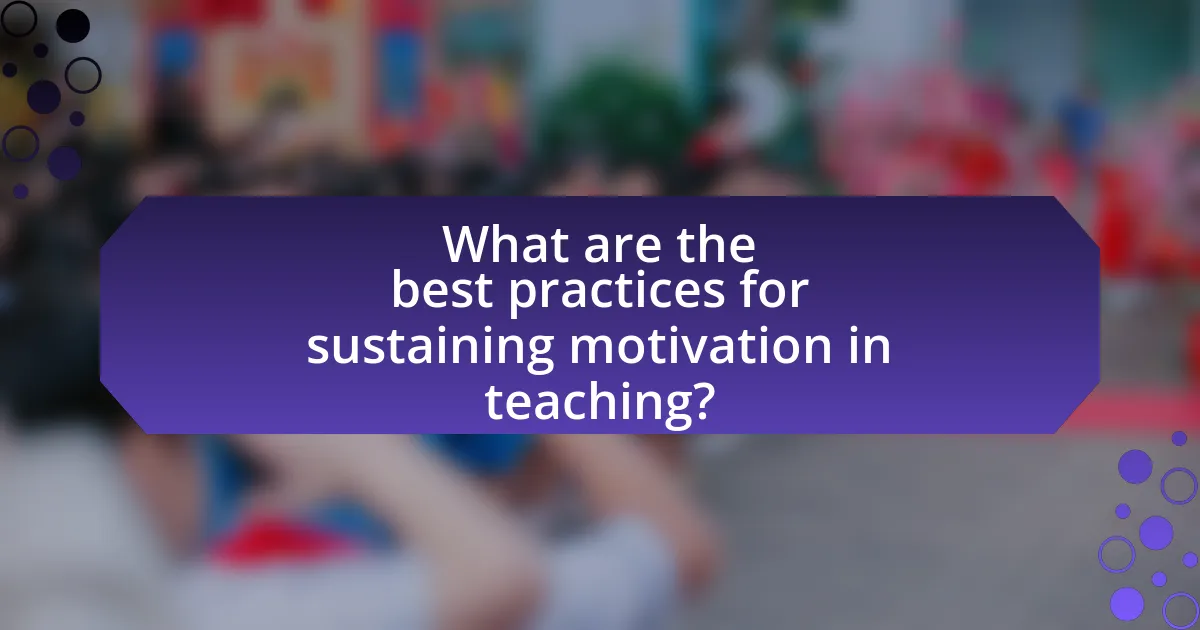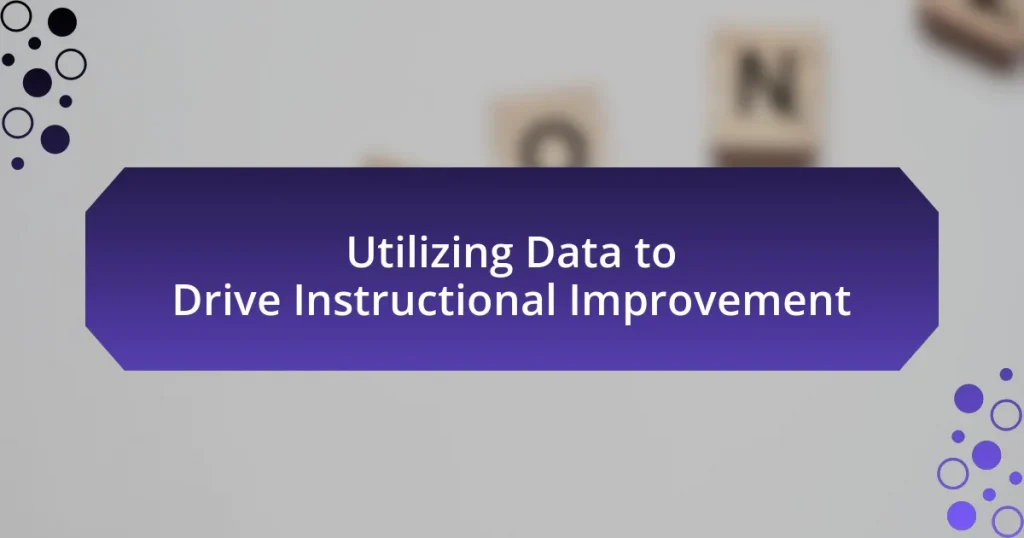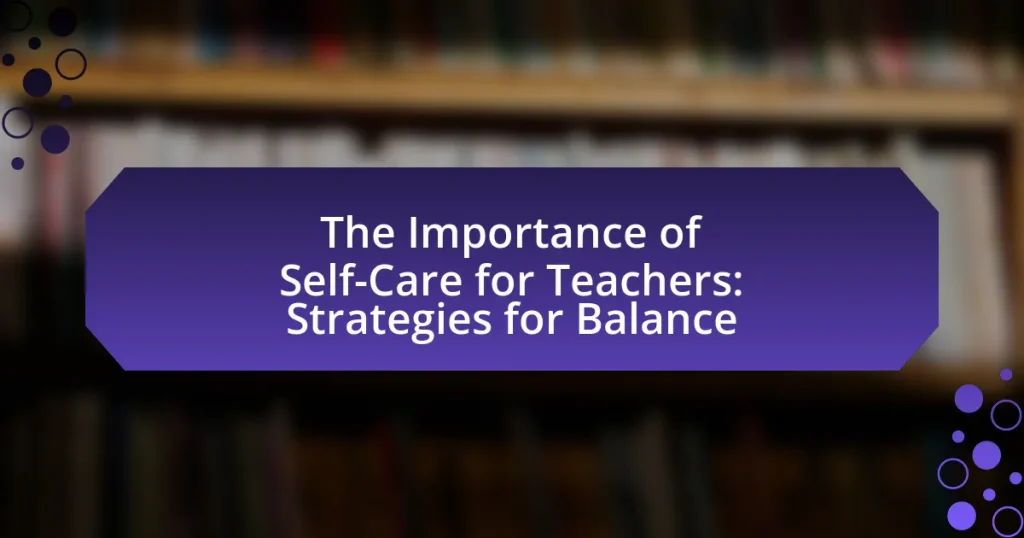The article focuses on strategies for teachers to maintain motivation throughout their careers. It emphasizes the importance of teacher motivation in enhancing student engagement and academic performance, as well as its correlation with job satisfaction and retention rates. Key challenges affecting motivation, such as high workloads and student behavior, are discussed alongside effective practices for fostering a supportive learning environment. Additionally, the article highlights the role of professional development, goal-setting, and self-care in sustaining motivation, while also providing resources and community support options for educators.

What does it mean to stay motivated in your teaching career?
Staying motivated in your teaching career means maintaining a consistent drive to engage students and improve your teaching practices. This motivation can stem from a passion for education, a commitment to student success, and the desire for personal and professional growth. Research indicates that motivated teachers are more effective, as they foster a positive learning environment and inspire students to achieve their potential. For instance, a study published in the “Journal of Educational Psychology” found that teachers who exhibit high levels of motivation positively influence student engagement and academic performance.
Why is motivation important for teachers?
Motivation is crucial for teachers because it directly influences their effectiveness and the learning environment they create. Motivated teachers are more likely to engage students, foster a positive classroom atmosphere, and demonstrate resilience in the face of challenges. Research indicates that teacher motivation is linked to student achievement; for instance, a study published in the “Journal of Educational Psychology” found that motivated teachers positively impact student motivation and performance. Therefore, maintaining high levels of motivation among teachers is essential for enhancing educational outcomes.
How does motivation impact student learning outcomes?
Motivation significantly enhances student learning outcomes by increasing engagement, persistence, and academic performance. When students are motivated, they are more likely to participate actively in their learning process, leading to deeper understanding and retention of material. Research indicates that motivated students tend to set higher academic goals and exhibit greater effort, which correlates with improved grades and test scores. For instance, a study published in the “Journal of Educational Psychology” by Pintrich and Schunk (2002) found that intrinsic motivation positively influences students’ self-regulated learning and achievement. This evidence underscores the critical role motivation plays in shaping effective learning experiences and outcomes for students.
What are the long-term effects of teacher motivation on career satisfaction?
Teacher motivation significantly enhances long-term career satisfaction. Motivated teachers tend to experience higher levels of job fulfillment, which correlates with increased retention rates in the profession. Research indicates that motivated educators are more likely to engage in professional development, leading to improved teaching practices and student outcomes. A study by the National Center for Education Statistics found that teachers who reported high motivation levels also reported greater job satisfaction, which is crucial for maintaining a committed workforce in education.
What are common challenges teachers face that affect motivation?
Common challenges teachers face that affect motivation include high workload, lack of administrative support, and student behavioral issues. High workload often leads to burnout, as teachers juggle lesson planning, grading, and administrative tasks, which can diminish their enthusiasm for teaching. Lack of administrative support can leave teachers feeling isolated and undervalued, making it difficult to maintain motivation. Additionally, student behavioral issues can create a challenging classroom environment, leading to frustration and decreased job satisfaction. Research indicates that these factors significantly contribute to teacher attrition rates, with studies showing that nearly 50% of teachers leave the profession within the first five years due to these challenges.
How do workload and stress influence teacher motivation?
Workload and stress negatively influence teacher motivation by leading to burnout and decreased job satisfaction. High workloads often result in teachers feeling overwhelmed, which diminishes their enthusiasm for teaching and commitment to their students. Research indicates that teachers experiencing high levels of stress are more likely to report lower levels of motivation and engagement in their work. For instance, a study published in the “Journal of Educational Psychology” found that excessive workload and stress are significant predictors of teacher attrition, highlighting the direct correlation between these factors and motivation levels.
What role does student behavior play in teacher motivation?
Student behavior significantly influences teacher motivation by directly impacting their job satisfaction and engagement levels. Positive student behavior, such as active participation and respect, fosters a supportive classroom environment, which enhances teachers’ enthusiasm and commitment to their work. Conversely, disruptive or disengaged student behavior can lead to frustration and burnout among teachers, diminishing their motivation. Research indicates that teachers who experience positive interactions with students report higher levels of job satisfaction and are more likely to remain in the profession, as evidenced by a study published in the “Journal of Educational Psychology” by Pianta, Hamre, and Allen, which highlights the correlation between student-teacher relationships and teacher motivation.

How can teachers cultivate and maintain motivation?
Teachers can cultivate and maintain motivation by creating a supportive and engaging learning environment. This involves implementing strategies such as setting clear goals, providing constructive feedback, and fostering a sense of community among students. Research indicates that when teachers establish specific, achievable objectives, students are more likely to stay focused and motivated (Locke & Latham, 2002). Additionally, incorporating varied teaching methods and recognizing student achievements can enhance motivation, as diverse approaches cater to different learning styles and celebrate progress. By actively involving students in their learning process and encouraging self-reflection, teachers can further sustain motivation over time.
What strategies can teachers use to boost their motivation?
Teachers can boost their motivation by setting clear goals and engaging in professional development. Establishing specific, measurable, achievable, relevant, and time-bound (SMART) goals helps teachers focus their efforts and track their progress, which can enhance their sense of accomplishment. Additionally, participating in workshops, conferences, and collaborative learning opportunities fosters a growth mindset and keeps educators inspired by new teaching methods and ideas. Research indicates that teachers who engage in continuous professional development report higher job satisfaction and motivation levels, as they feel more competent and connected to their profession.
How can setting personal goals enhance motivation?
Setting personal goals enhances motivation by providing clear direction and measurable benchmarks for achievement. When individuals establish specific, attainable goals, they create a roadmap that guides their actions and decisions, fostering a sense of purpose. Research indicates that goal-setting can lead to higher performance levels; for instance, a study published in the “American Journal of Lifestyle Medicine” found that individuals who set specific goals were 10 times more likely to achieve them compared to those who did not. This structured approach not only boosts self-efficacy but also encourages persistence, as individuals can track their progress and celebrate small victories along the way.
What role does professional development play in maintaining motivation?
Professional development plays a crucial role in maintaining motivation by enhancing educators’ skills and knowledge, which fosters a sense of competence and confidence. When teachers engage in professional development, they are exposed to new teaching strategies, resources, and collaborative opportunities that invigorate their practice. Research indicates that ongoing training and support can lead to increased job satisfaction and a stronger commitment to the teaching profession. For instance, a study published in the “Journal of Educational Psychology” found that teachers who participated in regular professional development reported higher levels of motivation and engagement in their work. This correlation underscores the importance of continuous learning in sustaining enthusiasm and effectiveness in teaching careers.
How can teachers create a supportive environment for motivation?
Teachers can create a supportive environment for motivation by fostering positive relationships, providing constructive feedback, and promoting a growth mindset. Positive relationships between teachers and students enhance trust and engagement, which are crucial for motivation. Constructive feedback helps students understand their progress and areas for improvement, reinforcing their efforts and encouraging persistence. Promoting a growth mindset, where students are encouraged to view challenges as opportunities for learning, further supports their motivation by instilling resilience and a desire to improve. Research indicates that classrooms characterized by supportive teacher-student interactions lead to higher student motivation and achievement (Pianta, 2006).
What are effective ways to foster collaboration among teachers?
Effective ways to foster collaboration among teachers include establishing regular collaborative planning sessions and creating professional learning communities. Regular planning sessions allow teachers to share resources, strategies, and insights, enhancing their teaching practices. Professional learning communities encourage ongoing dialogue and support among educators, leading to improved student outcomes. Research indicates that schools with strong collaborative cultures see a 10-20% increase in student achievement, demonstrating the positive impact of collaboration on educational effectiveness.
How can positive relationships with students enhance teacher motivation?
Positive relationships with students significantly enhance teacher motivation by fostering a supportive and engaging classroom environment. When teachers build strong connections with their students, they experience increased job satisfaction and a sense of purpose, which are critical factors in maintaining motivation. Research indicates that teachers who feel valued and respected by their students are more likely to be enthusiastic and committed to their teaching roles. For instance, a study published in the “Journal of Educational Psychology” found that positive student-teacher relationships correlate with higher levels of teacher engagement and lower burnout rates. This connection not only boosts teachers’ morale but also encourages them to invest more effort in their teaching practices, ultimately benefiting both educators and students.

What are the best practices for sustaining motivation in teaching?
The best practices for sustaining motivation in teaching include setting clear goals, fostering a positive classroom environment, and engaging in continuous professional development. Setting clear goals helps teachers maintain focus and measure progress, which is essential for motivation. A positive classroom environment encourages student engagement and satisfaction, further motivating teachers to invest in their work. Continuous professional development, such as attending workshops or collaborating with colleagues, enhances teaching skills and keeps educators inspired. Research indicates that teachers who participate in ongoing training report higher job satisfaction and motivation levels, reinforcing the importance of these practices.
How can teachers incorporate self-care into their routine?
Teachers can incorporate self-care into their routine by scheduling regular breaks throughout the day to recharge mentally and physically. Research indicates that taking short breaks can enhance focus and productivity, which is crucial for maintaining motivation in teaching. Additionally, teachers should engage in activities they enjoy outside of work, such as exercise or hobbies, as studies show that personal interests can significantly reduce stress and improve overall well-being. Implementing mindfulness practices, such as meditation or deep-breathing exercises, can also help teachers manage stress effectively, leading to a more balanced and fulfilling teaching career.
What are some effective self-care strategies for teachers?
Effective self-care strategies for teachers include setting boundaries, engaging in regular physical activity, and practicing mindfulness. Setting boundaries helps teachers manage their workload and prevent burnout by designating specific times for work and personal life. Engaging in regular physical activity, such as walking or yoga, has been shown to reduce stress and improve overall well-being, as supported by research from the American Psychological Association, which highlights the mental health benefits of exercise. Practicing mindfulness through techniques like meditation or deep-breathing exercises can enhance emotional resilience and focus, as evidenced by studies indicating that mindfulness practices can lead to reduced anxiety and improved job satisfaction among educators.
How does work-life balance contribute to teacher motivation?
Work-life balance significantly enhances teacher motivation by reducing stress and preventing burnout. When teachers maintain a healthy separation between their professional responsibilities and personal life, they experience increased job satisfaction and engagement. Research indicates that teachers who achieve a favorable work-life balance report higher levels of motivation and commitment to their roles, as they feel more energized and focused in the classroom. For instance, a study published in the “Journal of Educational Psychology” found that teachers with better work-life balance exhibited greater enthusiasm for teaching and improved student outcomes. This correlation underscores the importance of work-life balance as a critical factor in sustaining teacher motivation.
What resources are available to help teachers stay motivated?
Various resources are available to help teachers stay motivated, including professional development programs, peer support networks, and online communities. Professional development programs, such as workshops and conferences, provide teachers with new strategies and insights that can reinvigorate their teaching practices. Peer support networks, like teacher collaboration groups, foster a sense of community and shared experiences, which can enhance motivation. Online communities, such as forums and social media groups, allow teachers to connect with others, share resources, and gain encouragement. Research indicates that teachers who engage in collaborative professional development report higher levels of job satisfaction and motivation, highlighting the effectiveness of these resources.
How can mentorship programs support teacher motivation?
Mentorship programs can significantly enhance teacher motivation by providing guidance, support, and professional development opportunities. These programs foster a collaborative environment where experienced educators share best practices and strategies, which can lead to increased confidence and job satisfaction among mentees. Research indicates that teachers involved in mentorship programs report higher levels of motivation and commitment to their profession, as they feel valued and supported in their roles. For instance, a study published in the “Journal of Educational Psychology” found that teachers who participated in mentorship initiatives experienced a 20% increase in their motivation levels compared to those who did not engage in such programs. This evidence underscores the positive impact of mentorship on teacher motivation.
What online communities or networks can teachers join for motivation?
Teachers can join online communities such as Edutopia, Teachers Pay Teachers, and the Facebook group “Teachers Helping Teachers” for motivation. Edutopia offers a wealth of resources and a supportive community focused on innovative teaching practices, while Teachers Pay Teachers allows educators to share and access teaching materials, fostering collaboration. The Facebook group “Teachers Helping Teachers” provides a platform for educators to share experiences, seek advice, and find encouragement from peers. These communities are designed to enhance professional development and provide emotional support, which is essential for maintaining motivation in the teaching profession.
What practical tips can teachers implement to enhance their motivation?
Teachers can enhance their motivation by setting clear, achievable goals for their professional development. Establishing specific objectives allows teachers to focus their efforts and measure their progress, which can lead to a sense of accomplishment. Research indicates that goal-setting is linked to increased motivation and performance in educational settings (Locke & Latham, 2002). Additionally, engaging in collaborative activities with colleagues, such as peer observations or team teaching, fosters a supportive environment that can boost morale and motivation. Studies show that collaboration among educators enhances job satisfaction and reduces feelings of isolation (Goddard et al., 2007). Lastly, incorporating student feedback into teaching practices can provide teachers with valuable insights, reinforcing their sense of purpose and connection to their students, which is crucial for maintaining motivation.



